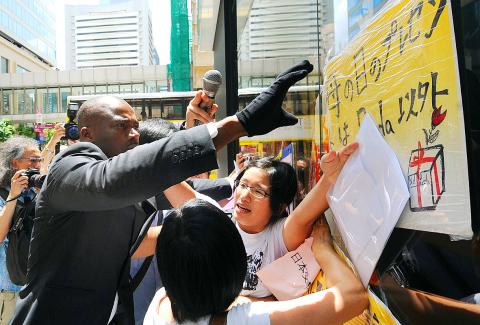Italian luxury fashion house Prada yesterday made a lackluster stock market debut in Hong Kong amid choppy global markets and waning investor interest after a string of blockbuster initial public offerings (IPO).
The family-controlled firm’s stock opened just 0.25 percent higher at HK$39.60 compared with its IPO price of HK$39.50.
After a little bit of intraday movement, it ended the session where it started at HK$39.60, while Hong Kong’s benchmark Hang Seng index rose 1.9 percent.

Photo: AFP
The Milan-based company nevertheless trumpeted its listing debut in Hong Kong — increasingly a favored gateway for foreign companies trying to tap Chinese capital.
“We are the first Italian luxury brand company to list here and this is a landmark event for the Hong Kong stock exchange,” chief executive Patrizio Bertelli said.
“I am positive the Greater China market will be an interesting market for luxury good brands. The first signs are very good,” he told reporters.
Hong Kong Stock Exchange chairman Ronald Arculli lauded the listing as a “good start” for Prada and said the exchange was doing its best to attract quality companies to list in the territory, despite volatile global markets.
The Italian group, which includes the Prada, Miu Miu, Church’s and Car Shoe brands, is the latest high-end fashion brand to tap the huge Chinese market, the world’s fastest-growing market for luxury goods.
However, weak market sentiment had pushed Prada to price its Hong Kong shares at the lower end of its price range and shrink the size of its highly anticipated IPO, raising a lower-than-expected US$2.14 billion.
Prada sold 423.2 million shares after floating 20 percent of its stock. Before the IPO, the brand had been 95 percent owned by the Prada family and executives.
Outside the stock exchange, Prada received some unwanted publicity when two dozen women’s activists staged a protest accusing the group of sexual discrimination and chanted “Only the devil wears Prada! Shame on Prada!”
The protest stemmed from the case of Rina Bovrisse, a 37-year-old former Prada manager in Japan who claimed she was unfairly fired in March last year after being told by a company executive that she was “ugly” and didn’t have “the Prada look.”

On Tuesday, US President Donald Trump weighed in on a pressing national issue: The rebranding of a restaurant chain. Last week, Cracker Barrel, a Tennessee company whose nationwide locations lean heavily on a cozy, old-timey aesthetic — “rocking chairs on the porch, a warm fire in the hearth, peg games on the table” — announced it was updating its logo. Uncle Herschel, the man who once appeared next to the letters with a barrel, was gone. It sparked ire on the right, with Donald Trump Jr leading a charge against the rebranding: “WTF is wrong with Cracker Barrel?!” Later, Trump Sr weighed

HEADWINDS: Upfront investment is unavoidable in the merger, but cost savings would materialize over time, TS Financial Holding Co president Welch Lin said TS Financial Holding Co (台新新光金控) said it would take about two years before the benefits of its merger with Shin Kong Financial Holding Co (新光金控) become evident, as the group prioritizes the consolidation of its major subsidiaries. “The group’s priority is to complete the consolidation of different subsidiaries,” Welch Lin (林維俊), president of the nation’s fourth-largest financial conglomerate by assets, told reporters during its first earnings briefing since the merger took effect on July 24. The asset management units are scheduled to merge in November, followed by life insurance in January next year and securities operations in April, Lin said. Banking integration,

LOOPHOLES: The move is to end a break that was aiding foreign producers without any similar benefit for US manufacturers, the US Department of Commerce said US President Donald Trump’s administration would make it harder for Samsung Electronics Co and SK Hynix Inc to ship critical equipment to their chipmaking operations in China, dealing a potential blow to the companies’ production in the world’s largest semiconductor market. The US Department of Commerce in a notice published on Friday said that it was revoking waivers for Samsung and SK Hynix to use US technologies in their Chinese operations. The companies had been operating in China under regulations that allow them to import chipmaking equipment without applying for a new license each time. The move would revise what is known

Artificial intelligence (AI) chip designer Cambricon Technologies Corp (寒武紀科技) plunged almost 9 percent after warning investors about a doubling in its share price over just a month, a record gain that helped fuel a US$1 trillion Chinese market rally. Cambricon triggered the selloff with a Thursday filing in which it dispelled talk about nonexistent products in the pipeline, reminded investors it labors under US sanctions, and stressed the difficulties of ascending the technology ladder. The Shanghai-listed company’s stock dived by the most since April in early yesterday trading, while the market stood largely unchanged. The litany of warnings underscores growing scrutiny of